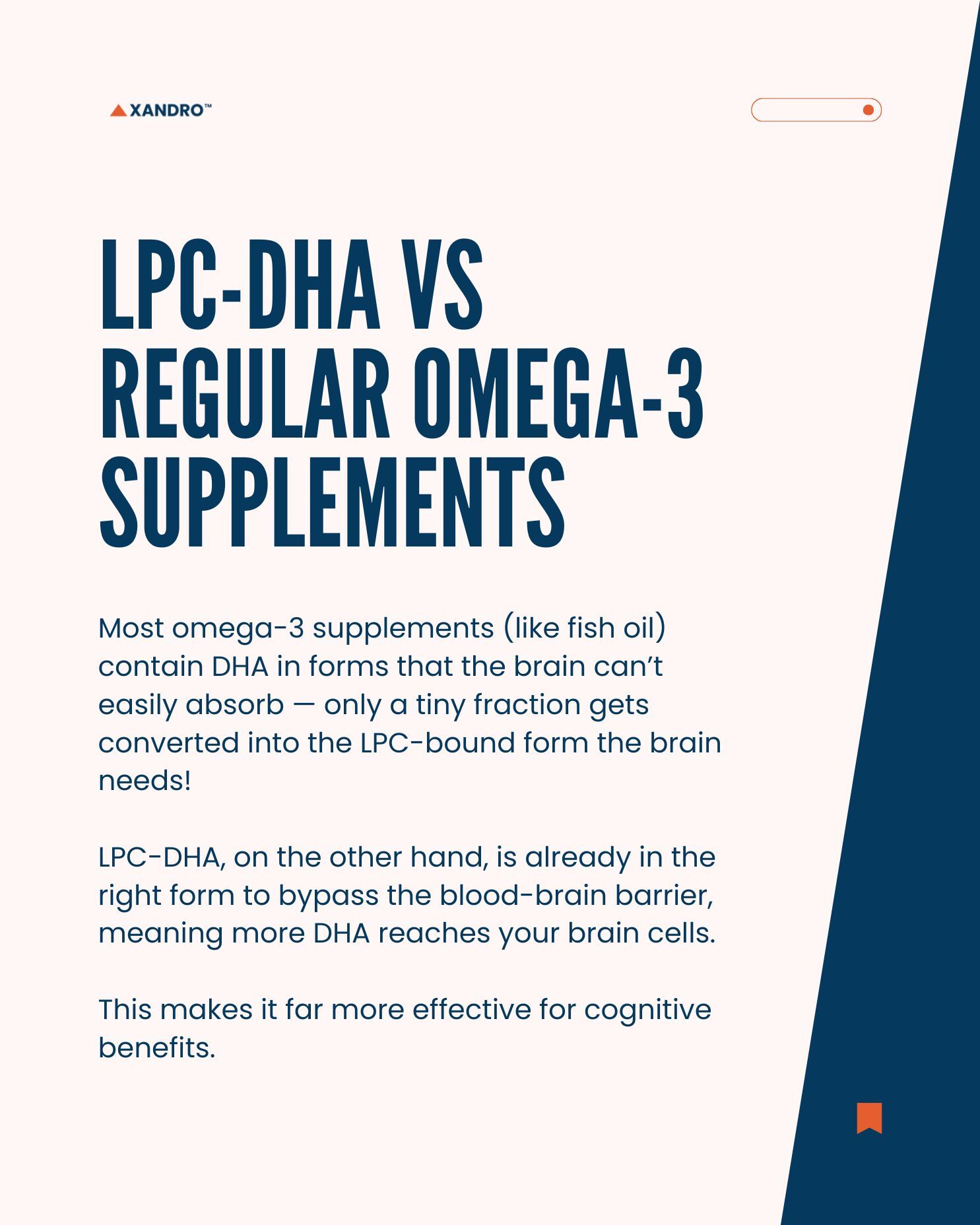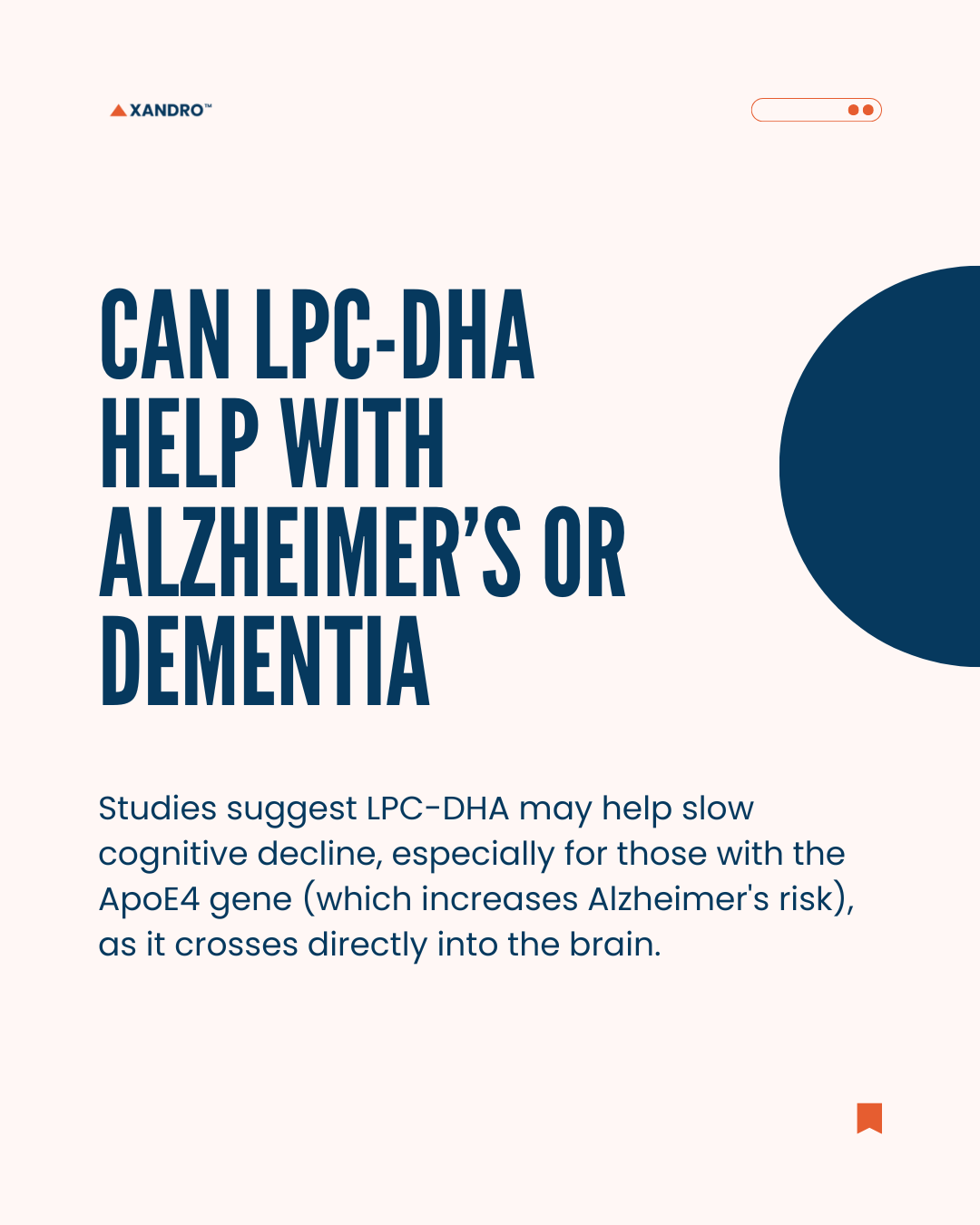FAQs about LYTOVETA LPC: An LPC-DHA Omega-3 Supplement
17th Jun 2025
LPC DHA Supplement: Why This New Form of Omega-3 Is Making Waves
Omega-3s are great for your brain, but did you know most supplements fail to deliver them where they’re needed most?
This is where LPC-DHA comes in — a breakthrough form of omega-3 that actually reaches your brain and eyes. Unlike regular fish oil, LPC-DHA (like in LYSOVETA™ and LPC Neuro) uses a special carrier to bypass the blood-brain barrier. Whether you’re looking for the best LPC-DHA supplement, curious about LPC-DHA krill oil, or wondering ‘Do DHA supplements work?’, we’ve got the answers.
LPC Neuro and LYSOVETA™ FAQs Part 1
What is LPC DHA?
LPC DHA is a special form of the omega-3 fatty acid DHA (docosahexaenoic acid) that’s bound to lysophosphatidylcholine (LPC), a fat molecule that helps it cross into the brain more effectively. Unlike regular DHA supplements, which struggle to pass the blood-brain barrier, LPC DHA uses a natural transport system (via a protein called Mfsd2a) to deliver DHA directly to brain cells. This makes it much better for supporting memory, focus and overall brain health, especially as we age or for those at higher risk of cognitive decline.
How does LPC-DHA differ from regular omega-3 supplements?
Most omega-3 supplements (like fish oil) contain DHA in forms that the brain can’t easily absorb — only a tiny fraction gets converted into the LPC-bound form the brain needs. LPC-DHA, on the other hand, is already in the right form to bypass the blood-brain barrier, meaning more DHA reaches your brain cells. Think of it like a VIP pass: regular omega-3s wait in line, while LPC-DHA gets fast-tracked inside. This makes it far more effective for cognitive benefits.

What is the best LPC-DHA supplement available?
The best LPC-DHA supplement currently is LYSOVETA™, a patented form of LPC-bound DHA/EPA derived from krill oil. The LPC omega-3 supplement. LPC Neuro, uses LYSOVETA™ to deliver high-absorption omega-3s straight to the brain. Unlike traditional fish oil, it’s designed to boost brain DHA levels efficiently, making it great for ageing adults, ApoE4 carriers (higher Alzheimer’s risk), or anyone wanting sharper cognition.
Do DHA supplements work for brain health?
Regular DHA supplements can support general health (like heart function), but most fail to significantly boost brain DHA levels because they can’t cross the blood-brain barrier well. LPC-DHA supplements are the exception — they’re proven to increase brain DHA, improve memory (even in Alzheimer’s-prone mice) and protect neurons. So, while standard DHA pills might not move the needle for cognition, LPC DHA omega 3 (like LYSOVETA™) does.
Is it safe to take DHA every day?
It is generally safe to take DHA (docosahexaenoic acid) daily, especially in recommended doses. DHA is an essential omega-3 fatty acid that supports brain, heart and eye health. Traditional fish oil supplements, which contain DHA, are widely used and considered safe for most people. Note that very high doses may slightly increase bleeding risk in some individuals. Newer forms like LPC-DHA (a more absorbable type) also appear safe in early studies, but long-term research is still needed.
Read about the ideal DHA and EPA ratio for optimal health!
What does EPA DHA supplement do for the body?
EPA (eicosapentaenoic acid) and DHA are omega-3 fatty acids with multiple health benefits. They reduce inflammation, support heart health by lowering triglycerides and may improve mood and brain function. DHA is especially important for brain structure and memory, while EPA is linked to fighting depression and supporting heart health. Traditional supplements (like fish oil) provide these benefits, but newer LPC-bound forms (e.g., LYSOVETA™) are better absorbed by the brain, potentially offering stronger cognitive protection, especially for ageing adults or those with Alzheimer’s risk.
What is the best source of LPC DHA?
The best natural sources of LPC-DHA are raw fish, fish roe (eggs), krill, salmon and scallops, as cooking can reduce LPC content. For supplements, LYSOVETA™ (derived LPC-DHA krill oil) is a leading option, designed to boost brain absorption. Unlike regular fish oil, LPC-DHA crosses the blood-brain barrier more efficiently, making it great for cognitive health. Supplements like Xandro LPC Neuro use this advanced form to deliver DHA directly to the brain.
What is DPA Omega 3?
DPA (docosapentaenoic acid) is another omega-3 fatty acid, though less studied than EPA and DHA. It’s found in seafood and has anti-inflammatory properties. Some research suggests DPA may help lower chronic disease risk and support heart health, but it’s typically present in smaller amounts in supplements. Unlike LPC-DHA (which targets the brain), DPA is not as well understood but may complement the benefits of EPA and DHA in overall health.
Can LPC-DHA help with Alzheimer’s or dementia?
LPC-DHA shows promise for brain health. Studies suggest it may help slow cognitive decline, especially for those with the ApoE4 gene (which increases Alzheimer's risk). Unlike regular omega-3s, LPC-DHA crosses into the brain more efficiently, supporting memory and neuron protection. In mice, it improved brain DHA levels and memory tests, but more human trials are needed.

Is LPC-DHA better than krill oil for brain absorption?
While krill oil contains some brain-supportive fats, most of its DHA isn’t in the LPC form the brain can easily use. LPC-DHA supplements (like LYSOVETA™) are specially designed to bypass this issue — studies show they deliver more DHA to the brain than untreated krill oil.
How does LPC-DHA cross the blood-brain barrier?
Your brain has a protective ‘gate’ (the blood-brain barrier) that blocks most supplements. LPC-DHA uses a special ‘key’ called the Mfsd2a transporter, which is a natural protein that shuttles LPC-bound fats directly into brain cells. Regular omega-3s lack this key, making LPC-DHA far more effective.
Does LPC-DHA improve memory and focus?
Research shows LPC-DHA boosts brain DHA levels, which are critical for memory, learning and focus. In studies, it improved cognitive performance in tasks (like maze navigation in mice) and increased brain proteins linked to memory. For humans, this could mean sharper mental clarity, especially with ageing.
Who benefits most from LPC-DHA supplements? (ApoE4 carriers, older adults, etc.)
Three groups benefit most:
- ApoE4 gene carriers (higher Alzheimer's risk): Their brains struggle to absorb regular DHA, but LPC-DHA bypasses this issue.
- Older adults: As we age, our brains absorb less DHA naturally; LPC-DHA helps compensate.
- People with low fish intake: If you don’t eat enough fatty fish, LPC-DHA supplements can boost brain and body DHA levels more effectively than standard fish oil.
Can LPC-DHA improve kidney function and recovery?
Studies show LPC-DHA helps kidneys recover after injury (like surgery or reduced blood flow). It reduces inflammation, repairs damaged kidney cells and may protect against long-term damage. The key is its ability to activate the Mfsd2a protein, which helps kidney cells heal.
Learn more about boosting kidney health with LPC omega-3s here.
End Note
That’s part one of our LPC and LYSOVETA FAQs!
If you want omega-3s that work, especially for brain and eye health, LPC-DHA is a game-changer. It’s safer and more effective than standard DHA supplements and research backs its benefits. Ready to try? Look for LPC-DHA supplements for sale (like LPC Neuro) to support your brain today. Still have questions? Check out part two of our LPC Neuro and LYSOVETA™ FAQs for more!
